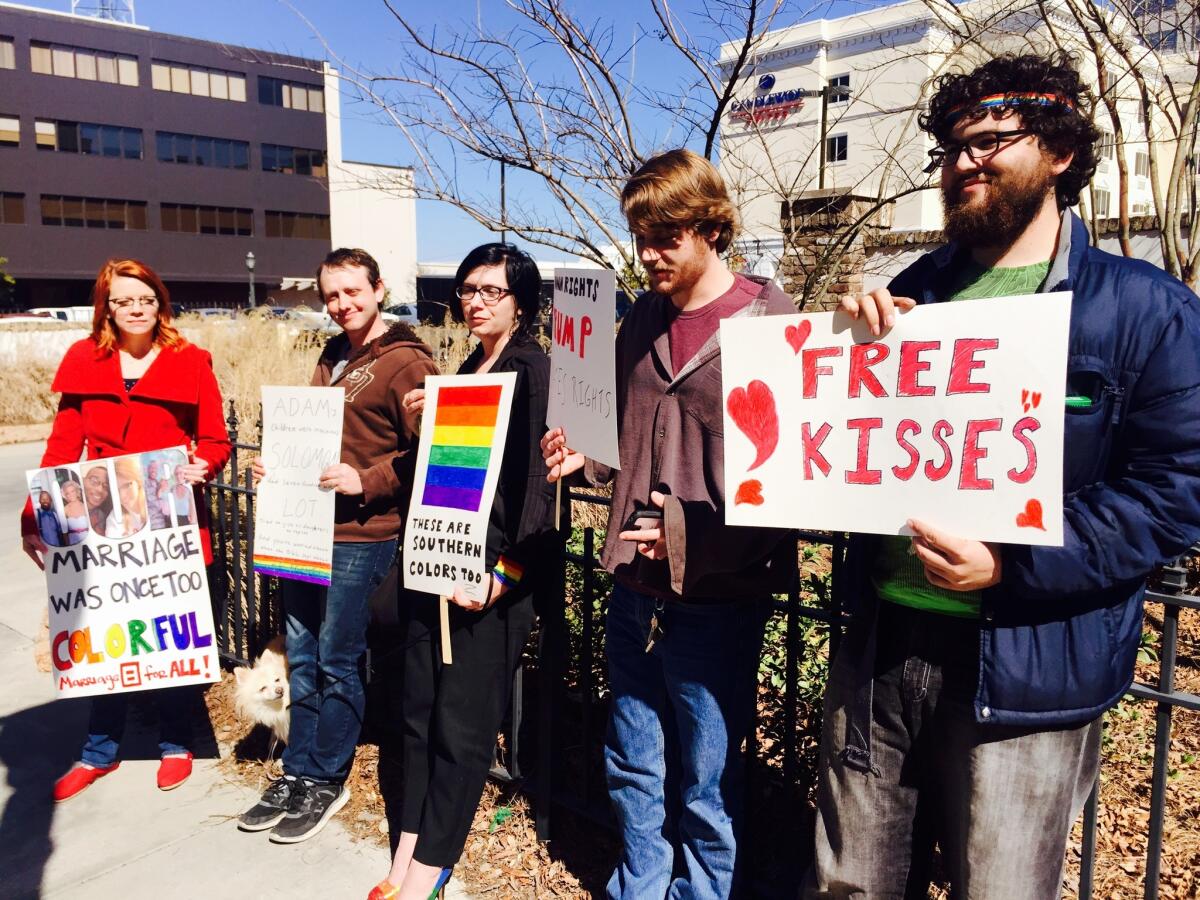Same-sex marriages halted in Alabama: What happens next

- Share via
Probate courts in Alabama’s most populous cities stopped issuing marriage licenses to same-sex couples Wednesday, a day after the state’s Supreme Court ordered judges to halt allowing such unions.
With the state judiciary now caught between a federal judge’s order overturning Alabama’s voter-approved ban on same-sex marriage, and Tuesday’s ruling from the state’s highest court, legal experts say the issue is unlikely to be resolved until the U.S. Supreme Court issues a ruling on same-sex marriages later this year.
In Birmingham and Montgomery-- the state’s two most populous cities -- probate courts are no longer issuing marriage licenses to same-sex couples. A probate court in Mobile has also halted issuing marriages licenses altogether, and a spokeswoman for the state chapter of the American Civil Liberties Union said her agency was not aware of any courts that were issuing licenses after the state Supreme Court ruling.
Six of the court’s nine justices concurred and a seventh did so in part in the 148-page ruling, published Tuesday night. One jurist dissented, and the court’s most outspoken opponent of gay marriage, Chief Justice Roy Moore, recused himself, the Associated Press reported.
“As it has done for approximately two centuries, Alabama law allows for ‘marriage’ between only one man and one woman. Alabama probate judges have a ministerial duty not to issue any marriage license contrary to this law,” the opinion reads. “Nothing in the United States Constitution alters or overrides this duty.”
The state’s top court expressed displeasure that lower federal courts have been acting while the U.S. Supreme Court’s decision on same-sex marriage is on the horizon.
“It is unfortunate that the federal judiciary has refused to stay the order striking down Alabama’s marriage-protection laws until the Supreme Court of the United States can conclusively rule on the issue within the next few months,” the opinion states.
Alabama had asked the U.S. Supreme Court last month to suspend Granade’s ruling, but the high court refused.
Alabama Supreme Court Chief Justice Roy Moore has repeatedly ordered probate judges, who issue marriage licenses in the state, not to give licenses to same-sex couples. Even after the U.S. Supreme Court let Granade’s ruling stand, some probate judges refused to issue licenses. Granade held another hearing and ordered the judges to comply with her order.
Moore’s February decree that judges should not issue licenses caused a fracture throughout Alabama courthouses. About one-third of the state’s 67 counties began issuing licenses after the U.S. high court refused to block Granade’s order, but the other two-thirds followed Moore’s direction and refused.
The state Supreme Court’s ruling was met with frustration by gay rights advocates.
“The Alabama Supreme Court led by Roy Moore did not even ask for briefing on the constitutional questions it rushed to get wrong,” Evan Wolfson, founder and president of advocacy group Freedom to Marry, said on his Twitter account.
Susan Watson, executive director of the ACLU in Alabama, said her office was reviewing the decision but suggested the advocacy group will challenge the Supreme Court ruling before the issue of gay marriage lands before the nation’s highest court this summer.
“The Alabama Supreme Court came to a decision on a question that no party presented to them. To that end, it is deeply disappointing that despite marriage equality being on the horizon for the whole nation, Alabama insists on being on the wrong side of history,” she said in a statement. “But it should be understood that this is merely just a bump in the road to marriage equality and we are examining further options to quickly bring it to fruition in Alabama.”
Legal challenges are unlikely to gain much traction though, with Alabama’s probate judges subject to the authority of both Granade and the state Supreme Court. Carl Tobias, a constitutional law professor at the University of Richmond, Va., said the state’s judges are unlikely to issue any more marriage licenses until the U.S. Supreme Court makes a definitive ruling on the issue later this year.
“We’re at a standoff here. This hasn’t happened in any other state,” Tobias said. “I’m afraid that’s where we are and it may not be resolved until the Supreme Court rules in June.”
Tobias said couples who want to marry could file complaints against probate judges who refuse to issue licenses, which would allow Granade to find those judges in contempt for defying her federal court order. Granade could also file civil penalties against those judges, Tobias said.
A probate judge could then file an appeal with the U.S. Supreme Court, but Tobias said any further applications regarding same-sex marriage will likely be folded into the larger case.
In the meantime, Tobias said, marriage licenses issued between January and March will likely remain valid.
The state Supreme Court ruling was met with high praise by traditional marriage proponents, like Joe Godfrey, executive director of the Alabama Citizens Action Program.
“We are concerned about the family and the danger that same-sex marriage will have,” Godfrey told the Associated Press.
In Tuesday’s ruling, the Alabama Supreme Court cited the confusion among the state’s probate judges as a reason not to issue licenses. With some judges issuing licenses to same-sex couples and others refusing to do so, the state courts could see an “overnight revolution” as to how to enforce estate law, alimony decisions, custodial rights of children and other such issues.
The ruling was met with a furious reaction from Equality Alabama, one of the state’s largest gay rights groups.
“This move by the Alabama Supreme Court is nothing but an attempt at delaying the happiness that all families deserve -- a last-ditch effort to stand in the way of the love we’ve seen in these historic weeks,” the group’s board chairman, Ben Cooper, said in a statement. “As we get closer to the day the freedom to marry comes to all 50 states -- the Alabama Supreme Court is on the wrong side of history. Every day of denial is a day of harm for Alabama families.”
The U.S. Supreme Court is expected to rule on the constitutionality of gay marriage bans by late June.
Follow @JamesQueallyLAT and @TheRyanParker for breaking news
More to Read
Sign up for Essential California
The most important California stories and recommendations in your inbox every morning.
You may occasionally receive promotional content from the Los Angeles Times.













